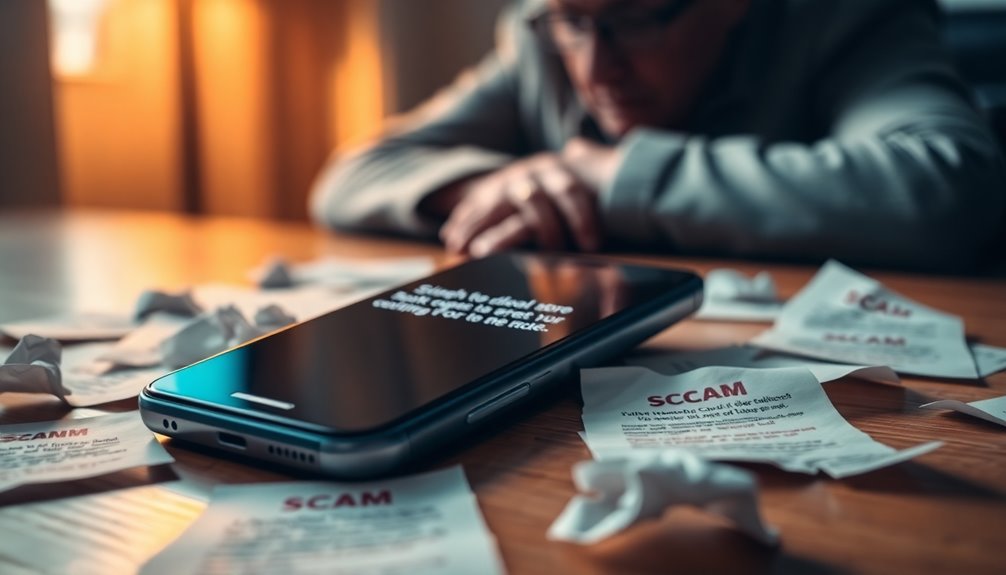Smishing scams are on the rise, especially targeting seniors like you. The top three scams include phony bank fraud warnings, where scammers send fake texts about suspicious activity to trick you into providing personal information. Next, watch out for bogus free gifts and prizes; these unsolicited texts often lead to phishing attempts. Finally, fake package delivery issues spike during the holidays, with scammers using texts to claim delivery problems. Always verify any unexpected messages by contacting official sources. For more detailed insights into how to protect yourself, keep an eye on the latest updates.
Key Takeaways
- Smishing scams often involve fake bank fraud alerts, tricking victims into providing sensitive information.
- Unsolicited texts offering free gifts or prizes are common scams that should be ignored and verified.
- Package delivery scams increase during holidays, with fake messages prompting victims to click harmful links.
- Always verify unexpected communications through official channels to avoid falling victim to scams.
- Stay informed about new scam tactics to enhance your ability to recognize and avoid smishing attempts.
Phony Bank Fraud Warnings
In recent years, there's been a staggering 2,000% increase in phony bank fraud warnings, making it vital for you to stay vigilant.
Scammers often send fake texts asking you to verify account information, confirm large purchases, or report suspicious logins. These smishing attempts can look alarmingly real, making it tough to distinguish them from legitimate alerts.
If you receive such a message, don't reply or click on any links. Instead, verify the information directly through your bank's official channels.
Bogus Free Gifts & Prizes

It's essential to ignore unsolicited gift texts and verify any offers through official company websites instead.
Legitimate promotions typically come from recognized sources, and you should expect to see them advertised through trustworthy channels.
Always prioritize your security by staying cautious and double-checking any unexpected claims of free gifts. Additionally, be aware that necessary cookies are often used to enhance the browsing experience and can help protect your privacy online.
Fake Package Delivery Issues

As the holiday season ramps up, the risk of package delivery scams rises sharply. Scammers often exploit this busy time by sending fake texts about delivery issues to trick you into clicking malicious links. To stay safe, remember to:
- Avoid clicking links in unexpected delivery messages.
- Contact companies directly through official customer service channels if you receive suspicious texts. Additionally, be aware that water efficiency is an important consideration when making purchases, as scammers may also exploit consumers' urgency to save money.
- Verify account status using the official app or website, especially for services like Amazon. Additionally, consider implementing a home security system to enhance your overall safety during the holiday season. Investing in a reliable system can provide peace of mind and deter potential threats to your home. It's important to protect your assets, as diversification can help mitigate risks from various scams. Furthermore, having a strong understanding of risk management strategies can significantly improve your ability to navigate potential threats.
Frequently Asked Questions
How Can I Identify a Smishing Scam Quickly?
To identify a smishing scam quickly, watch for unsolicited texts, suspicious links, and urgent requests for personal information. If in doubt, don't respond; verify through official channels to guarantee your safety.
What Should I Do if I Accidentally Clicked a Smishing Link?
If you accidentally clicked a smishing link, disconnect your device from the internet immediately. Run a security scan, change your passwords, and monitor your accounts for suspicious activity. Report the incident to your bank and authorities.
Are There Specific Signs That Indicate a Message Is Legitimate?
To spot a legitimate message, look for personalized greetings, official company logos, and correct grammar. If it's unexpected or requests sensitive info, it's probably a scam. Always verify through official channels before responding.
Can Smishing Scams Affect My Device's Security?
If you click a link from a smishing scam, malware could infect your device. Smishing scams can compromise your security by stealing personal data or granting unauthorized access, so always verify messages before taking action.
How Can I Educate Others About Smishing Risks?
You can educate others about smishing risks by sharing information on recognizing fake messages, encouraging them to verify communications through official channels, and emphasizing the importance of reporting suspicious texts to relevant authorities.
Conclusion
As you navigate the digital landscape, remember that staying vigilant against smishing scams is your best defense—like an old-school knight warding off dragons! By recognizing phony bank alerts, bogus prize claims, and fake delivery messages, you can protect your personal information and finances. Always verify through official channels when in doubt. With a little caution and awareness, you can outsmart these modern-day tricksters and keep your digital kingdom safe. Stay alert and safe out there! Additionally, make use of digital coupon tools overview to enhance your online shopping experience while ensuring you’re not falling prey to scams. These tools can help you uncover genuine offers and deals, steering you away from fraudulent sites that may compromise your information. Always remember, a little preventive action goes a long way in safeguarding your online identity!









